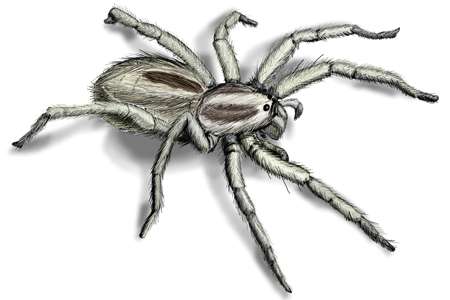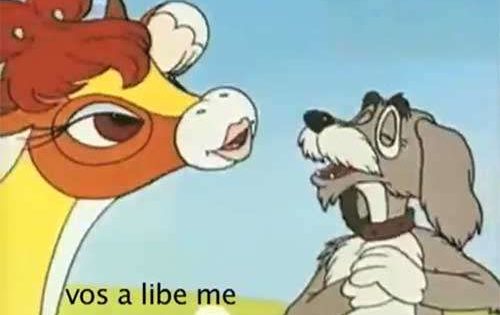English follows Yiddish. Poems follow biography.
Dem 6stn detsember 2013 hot di yidishe literarishe velt gelitn nokh a shvern klap. In Bruklin, N”Y iz avek in der eybikeyt der shrayber un moler Yoni Fayn. Fayn iz geven fun di zeltene yekhidim vos zayn lebns-geshikhte shtelt mit zikh for a kapitl yidishe geshikhte. A geboyrener in Kamenets-Podolsk, iz er in 1924, tsu 10 yor, fun dortn avek ven der tate, a Menshevik, hot gefirt di mishpokhe tsu ersht keyn Varshe un dernokh keyn Vilne kedey tsu antloyfn fun milkhome un politishe umruen. In der heym hot men geredt Rusish ober in der dortiker yidisher shul vu der tate iz geven a matematik-lerer hot Fayn zikh oysgelernt Yidish. Zint zayne yunge yorn hot Fayn zikh oysgedrikt say in kunst say in shraybn. Beyde formen kontsentrirn zik af der payn un umyoysher funem tsvantsikstn yorhundert un vaksn aroys fun zayne tife perzenlekhe ibertsaygungen. Tsu 16 yor iz er arayn in Bund un shpeter, voynendik in Varshe, hot er gearbet farn Bund bam boyen a kegnshtel kegn di Daytshn un poylishe fashistn.
Beshas der milkhome hot Fayn gefunen a mokem-miklet in Kobe, Yapan un dernokh in Shankhay, Khine af zeks yor. Dortn hot er gemoln un geshribn poezye. Zayn ershter band, A tlie unter di shtern, iz aroys ersht shpeter in 1947, in Meksike, nisht lang nokh dem vi er hot dortn imigrirt. In Meksike iz Fayn gevorn a lerer fun der yidisher literatur in dem dortikn yidishn lerer-seminar.
Glaykhtsaytik hot er tsugetsoygn dem ufmerk funem barimtn kinstler Diego Rivera vos hot aranzhirt an oysshtelung fun Fayns bilder in dem prestizhfuln Palatso de Beyas Artes. Zayn vantgemel gevidmet di korbones funem khurbn hengt ad-hayem in dem Panteon Izrealita afn ashkenazishn beys-oylem in der shtot Meksike. In 1953 hot Fayn khasene gehat mit zayn froy Helen, an amerikaner zhurnalitstn, un zey hobn zikh bazetst in Nyu-york. Er hot gelernt kunst un kunst-geshikhte un iz gevorn a profesor fun kunst in Hofstra Universitet biz er hot zikh pensyonirt in 1983. In Nyu-york hot er oykh dergreykht groys khshives vi a yidisher shrayber. In 1983 hot er aroysgegebn a band lider, Gute orkhim, un gor letstns, in 2008, iz aroys a nayer band lider, Der finfter zman. A zamlung dertseylungen, Nyu-yorker adresn, iz aroys in 1995. Fayns poezye un proze hobn zikh gedrukt in di vikhtikste yidishe zhurnaln vi Di goldene keyt, Undzer tsayt un Di Tsukunft., fun velkhn er iz yorn lang geven der redaktor.
In 1991 iz im tsugeteylt gevorn di Manger-premye. In an intervyu vos ikh hob opgehaltn mit im in 2000 hot er gezogt, “Dos gantse shraybn mayne hot tsu ton mit yekhidim, oder mit zeyere kinder, vos hobn epes farloyrn un vos viln boyen a naye heym.” Fayn iz a beemes moderner shrayber vos zayn netie optsuvisn di grenetsn tsvishn poezye un proze, kholem un realitet, moln un shraybn kumt shtark tsum oysdruk in zayn arbet. Af vifl ikh veys iz zayn dertseylung, Der hotel, (Nyu-yorker adres) di eyntsike dertseylung zayne vos iz aroys in der englisher iberzetsung. Es iz opgedrukt gevorn in Pakn Treger, dem zhurnal fun yidishn bikher-tsenter, harbst 2000 ibergezetst fun mir, Sheve Tsuker. A film Yoni Fayn: Mit pen un pendzl, af yidish mit englishe unterkeplekh, untern rezhi fun Dzhash Valetski, produtsirt fun der Yidish-lige, vet aroys in 2014. Ikh breng do dray lider kedey der leyenen zoln a bisl krign dem tam fun zayn poezye. Ale dray lider zaynen gedrukt gevorn in Fayns bikhl Der finfter zman. Dos ershte lid, “Bay mayn vigl” un di iberzetsung gefinen zikh ba mayn blog: Liderlikht: Yidishe lider vegn mames – shevazucker.com/blog tsuzamen mit nokh eyn lid vegn zayne tate-mame.
BAY MAYN VIGL
Bay mayn vigl
“Mayn zun, s’iz tsayt zikh uftsukhapn”,
Hot
mayn tate gezogt
Ober di mame hot oysgemurmlt:
,,Loz im, nokh a rege,
vayter kholemen”.
Di velt vet nit antloyfn”.
Ven ikh hob zikh in mitn
nakht fun bet ufgerisn
Un tsum fentster tsugelofn,
Kh’hob derzen az mayn
shtibl
Vert fun tseshoymte khvalyes getrogn
Un s’vet bald untergeyn.
Un
kh’bin durkhn fentster aroysgeshprungen
Un in a shvimendikn boym zikh
ongekhapt,
Un mayn mames verter zaynen far mir ufgegangen,
,,Loz im, nokh
a rege, kholemen”.
Un kh’bin zikher geven az kh’vel
Tsu a gutn breg
dershvimen.
*Der finfter zman *YIDISH-SHTOKHIM
Vayl mayn
loshn
Vil veynik-ver itst redn –
Red ikh tsu zikh aleyn
Mer vi es past
far aza eynem,
Vos iz nokh alts bam fuln zinen.
Kh’vil gornit
dervayzn,
Ikh red bloyz,
Vayl lib iz mir bizkl oysgeyn
Dos
vandreven
Durkh shtokhim fun Yidish.
Verbes zenen dortn
mames,
Horizontn – zilberne shmeykhlen,
Un ozeres – tife
balades.
On Yidish volt dos broyt
Nit gezetikt mayn hunger
Un di
vunders fun der velt
Voltn nit gehat genug verter
Bavundert tsu
vern.
A flants lozt zikh iberflantsn,
A toyshev – iberzetsn,
Dokh a
lid ibergezetst
Iz a regn-boygn on a himl,
Un a tsapl
aribergetrogn
Varft zikh in a meshugoim-hemdl.
In Yidish shteyen mir
tsukopns
Voglers mit fule zeklekh shtern,
Un bloyz Yidish kon
oystaytshn
Dem zinen fun tsekrigtn lebn.
*Der finfter zman
*
IKH GLEYB
Ikh gleyb az der kval kholemt tsu dergreykhn dem
taykh,
Un der taykh dem yam.
Un ikh gleyb az dos tsetrotene grezele
Hot
nit gegrint umzist,
Azoy zikh stam.
Ikh gleyb az der yo un der
neyn
Viln eyner tsum tsveytn dergeyn,
Un az friling,
Ven s’nemt
regenen
Shmeylkhlt afile a shteyn.
Un ikh gleyb
Az ven der umru fun
zeyger geyt oys –
Iz der zeyger nokh alts ful mit tsayt,
Un az dos tayere
iz shtendik noent
Un dos groyse shtendik vayt.
Un khotsh kh’bin nit
zikher tsi mayn gloybn
Iz nit mer vi an eygene zakh,
Fil ikh im vi dem
bri
Fun an ongeglitn ayzn.
Un ikh gleyb az der solovey zingt
Nit kedey
epes tsu dervayzn.
Un ikh gleyb az der kneytsh in mayn shtern
Shnaydt zikh
in mayn moyekh arayn
Vos pruvt a veg tsum himl gefinen
Un ikh gleyb, un
ikh gleyb,
Az mayn farloyrnkeyt gart mayn libshaft tsu dinen.
Un ikh
gleyb mitn gantsn hartsn,
Khotsh mayn harts iz fun lang shoyn
tseshpoltn
Un fun shteyner tsunoyfgeklept,
Az der mentsh, vos hot tsum
lebn gezogt “A dank”,
Hot nit umzist gelebt.
***
December 6, 2013 the world of Yiddish literature suffered another great loss. Writer and painter Yonia Fain passed away in Brooklyn, New York. He was one of those unique figures whose life story encapsulates a piece of Jewish history. Born in 1914 in Kamenetsk-Podolsk, he left it in 1924 at age 10 when his father, a Menshevik, took the family first to Warsaw and then to Vilna to escape war and political unrest. It was here, in the secular Yiddish school where his father taught mathematics, that Yonia learned Yiddish. From his youth Fain has expressed himself both as an artist and a writer. Both his art and writing which focus on the anguish and injustice of the 20th century have been shaped by his deep personal and political commitments. As a young man living in Warsaw, he worked for the Jewish Labor Bund as it sought to build a resistance against the Germans and the fascist Poles.
During the war Fain sought refuge in Kobe, Japan, and then in Shanghai, China for six years. There he painted and wrote poetry. His first volume, *A tlie unter di shtern* (A gallows under the stars), came out shortly after he emigrated to Mexico in 1947. There he taught Yiddish literature in the local Jewish Teacher’s Seminary and attracted the attention of the artist Diego Rivera, who arranged an exhibit of his paintings at the prestigious Palacio de Bellas Artes. Fain’s mural dedicated to the victims of the Holocaust still hangs in the Pantheon Israelita in the Ashkenazic cemetery in Mexico City.
In 1953 Fain married his wife Helen, an American journalist, and the couple moved to New York where he became a professor of art at Hofstra University. He also achieved great prominence as a Yiddish writer, publishing two more volumes of poetry: *Gute orkhim* (Good guests; 1983) and *Der finfter zman* (The fifth season; 2008), and a collection of short stories, *Nyu-yorker adresn* (New York Addresses, 1995). He has published widely, both poetry and prose, in major Yiddish journals such as *Di goldene keyt*, *Undzer tsayt* and *Di tsukunft* which he edited for many years. In 1991 he won Israel’s coveted Manger Prize for Yiddish Literature.
In an interview I conducted with him in 2000 Fain said, “All of my writing is about people, or their children, who have lost something and want to build a new home.” Fain is a truly modern writer whose desire to erase the borders between poetry and prose, dream and reality, painting and writing is often powerfully represented in his work.
Thus far, to my knowledge, only one of Fain’s stories, “The Hotel”, has appeared in English translation. It was translated by myself and published in the *Pakn Treger*, Fall 2000. A film “Yonia Fain: With Pen and Paintbrush” in Yiddish with English subtitles, directed by Josh Waletzky, will be released by the League for Yiddish in 2014. I would like to offer three of his poems along with English translations by myself so that the reader may get a taste of his poetry. All three poems were published in Fain’s book, *Der finfter zman* (The Fifth season). The first poem, “At My Cradle” and my translation can be found on my blog: Candles of Song: Yiddish Poems about Mothers – shevazucker.com/blog along with one other poem about his parents.
At My Cradle
My son, it’s time to wake up,”
My father said
But my
mother murmured:
“Let him, for another moment, keep dreaming,
The world
will not run away.”
When in the middle of the night I awoke from my bed
with a start
And ran to the window,
I saw my house
Being carried by
frothy waves
Soon to disappear.
And I jumped out of the window,
And
grabbed onto a floating tree,
And my mother’s words rose up before
me,
“Let him, for another moment, keep dreaming.”
And I was certain that I
would
Make it to a safe shore.
Tr. Sheva Zucker
Yiddish
Domains
Because my language
Is now spoken by so few people –
I
speak to myself more than befits
Someone still in charge of all his
faculties.
I don’t want to prove anything,
I just talk,
Because I
love to death
Wandering
Through domains of Yiddish.
Willows there
are mothers,
Horizons – silver smiles,
And lakes – deep
ballads.
Without Yiddish, bread
Would not satisfy my hunger
And the
wonders of the world
Would not have words enough
To express my
wonder.
A person with a home can be relocated,
A plant –
transplanted,
Yet a poem in translation
Is a rainbow without a
sky,
And a fresh quiver transported
Trembles in a
straight-jacket.
In Yiddish there stand at my head of my bed
Wanderers
with sacs full of stars,
And only Yiddish can interpret
The meaning of
quarrelsome life.
Tr. Sheva Zucker
I Believe
I
believe that the spring dreams of reaching the river,
And the river the
ocean.
And I believe that the trodden blade of grass
Has not grown green
in vain,
For no reason whatsoever.
I believe that Yes and No
Want
to reach each other,
And that in spring,
When it starts to rain
Even a
stone smiles.
And I believe
That when the pendulum of a clock stops
swinging –
The clock is still full of time,
And that that which is dear is
always close
And that which is great always far.
And although I’m not
sure if my belief
Is anything more than a personal thing,
I feel it like
the scald
Of a red-hot iron.
And I believe that the nightingale
sings
Not to prove anything.
And I believe that the wrinkle in my
forehead
Penetrates into my mind
That is trying to find a way to the
heavens
And I believe, and I believe,
That my lostness yearns to serve my
love.
And I believe with all my heart,
That although my heart has long
been shattered
And pasted together with stones,
That the person who had
said “Thank you” to life
Has not lived in vain.
Tr. Sheva
Zucker




